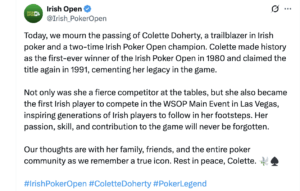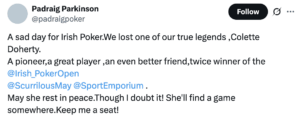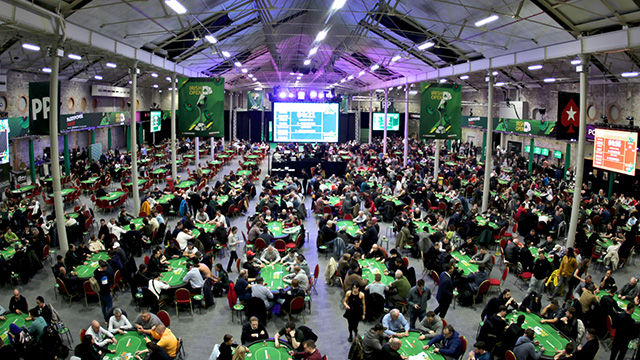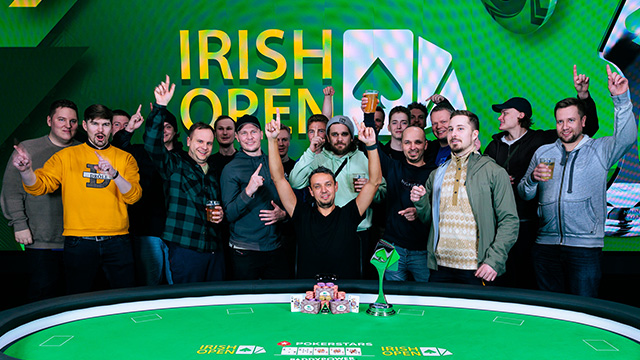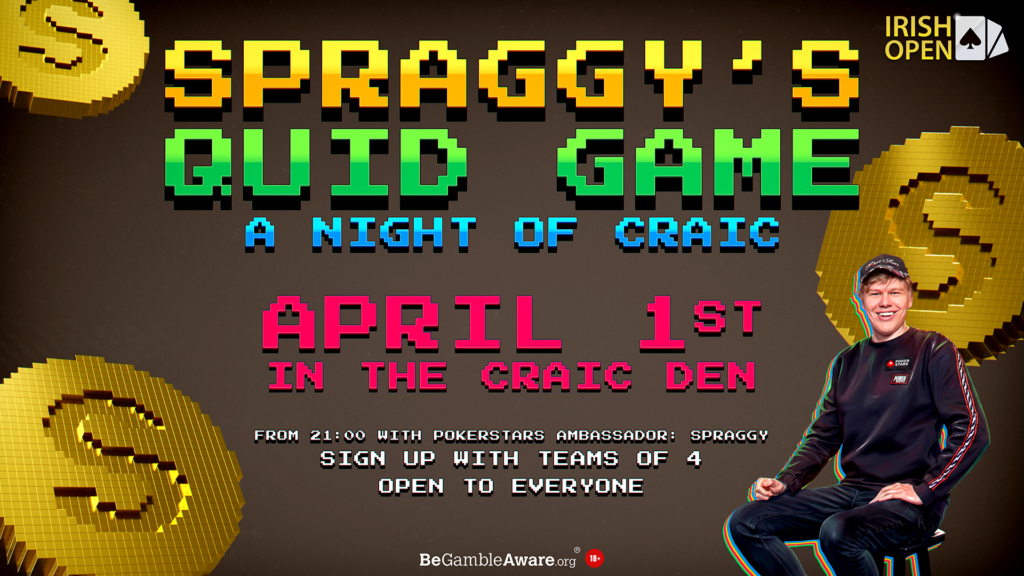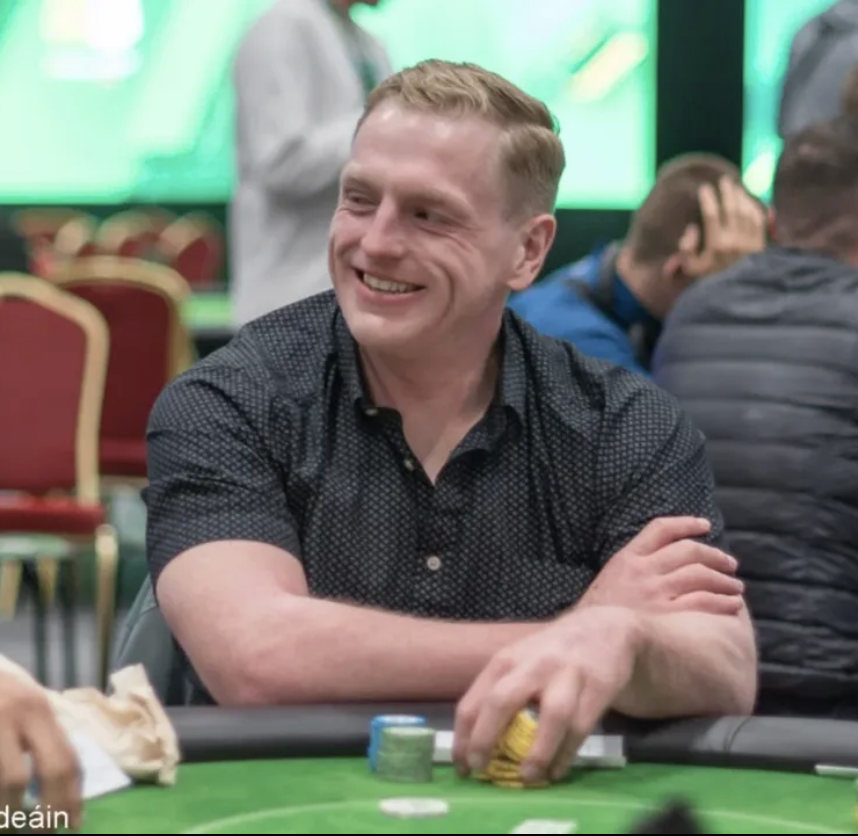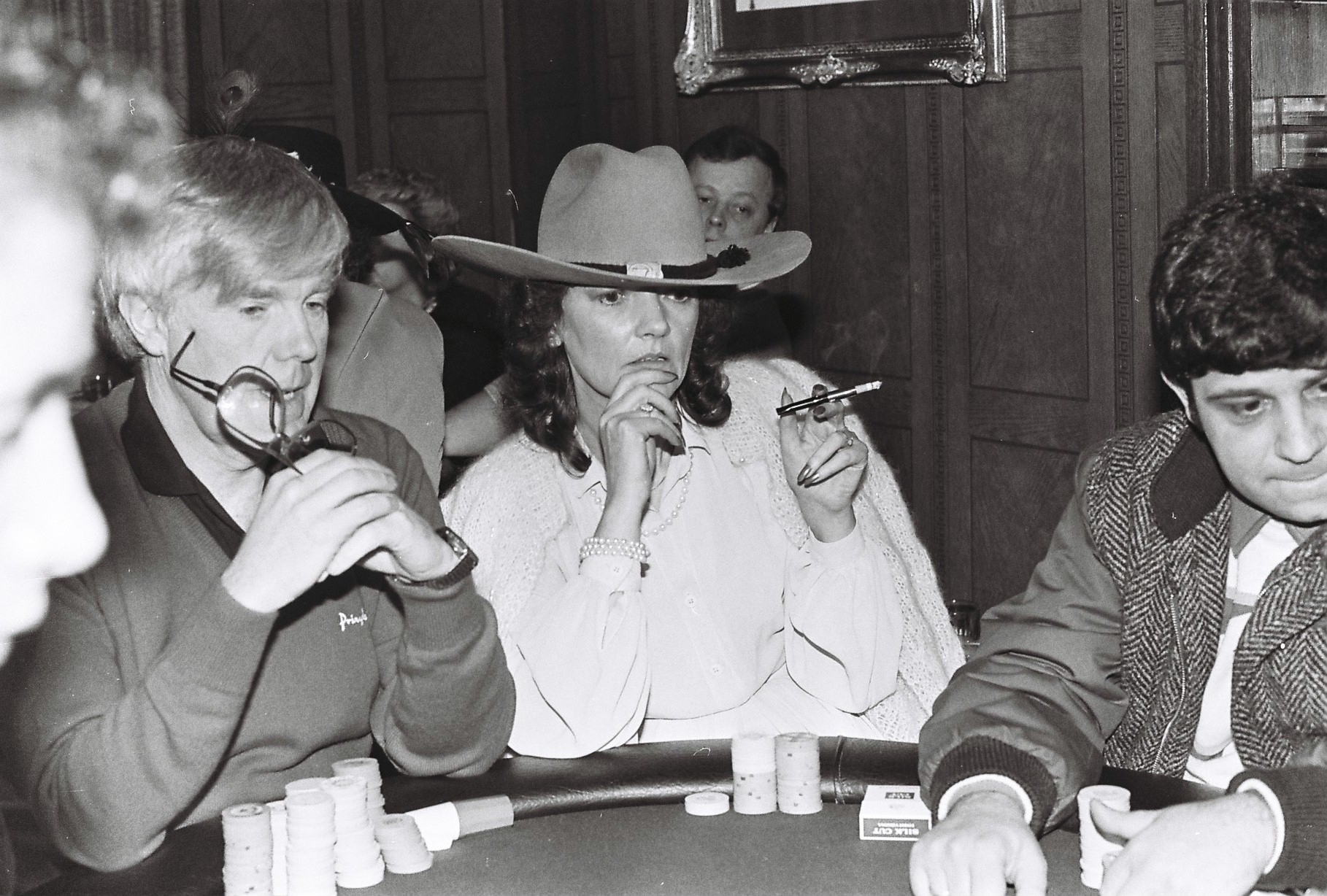
The 2025 Irish Poker Open concluded with a fairytale ending when local hero 22-year-old Simon Wilson captured the €1,150 Main Event title for a first prize of €600,000. His extraordinary achievement in beating a record field of 4,562 entries will, without a doubt, go down as a real milestone in Irish poker history.
But for many, the most significant moment in Irish poker history came in 1980 when Irish player Colette Doherty won the very first Irish Poker Open. What’s even more extraordinary is that Doherty managed to win the event AGAIN in 1991, making her one of the very few two-time Irish Open champions.
Doherty died in February this year at the age of 88. She is much missed by her many friends and family, but also the wider Irish and global poker communities. Without even trying, Doherty paved the way for women in poker and was a trailblazer for the game in Ireland. Not only was Colette a two-time Irish Open champion, she was also the first Irish player – and one of the first women – to compete in the World Series of Poker in Las Vegas.
But despite Doherty’s immense achievements and track record, very little has been published about her. For poker writer Christoffer Karlen, long fascinated by poker history, the lack of information about Colette Doherty was mystifying! And at the 2025 Irish Open, he found his chance to learn more about this incredible player, securing exclusive interviews with two of the people who arguably knew her best – her son Peter Doherty and poker legend Padraig Parkinson.
What follows is the untold story of one of poker’s greatest and perhaps most underrated players of all time – the story of Colette Doherty, along with images of Colette (supplied by Peter Doherty) and published here for the first time.
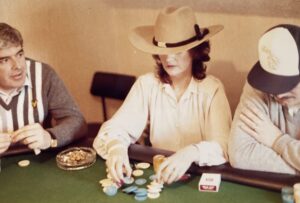
From Ballybunion To the Eccentric Club
To find out how Colette got into poker in the first place, you have to go back to the mid-70s. Peter Doherty relates:
My mother grew up in Ballybunion, a village with 20 pubs and a church. The winters were long and boring, so they used to go and play for pennies on top of one of the pubs. It was merely a way to pass the time. This was her first introduction to the game.

Colette, her husband, and Peter moved to Dublin a few years later. At this point, Dealer’s Choice was fairly popular in Ireland, and Colette started participating in games at other people’s houses (as there weren’t any casinos or cardrooms back then). Through the games, she befriended another legend on the Irish poker scene, Donnacha O’Dea. Eventually, she was invited to a game at his house. Padraig Parkinson recalls Colette sharing the story with him many times over the years:
O’Dea would have this game in Dublin, where the Irish prime minister, amongst others, was actually playing. This was around 1978-1979. Those who were playing the game were dinosaurs, who believed that women should be home doing the cooking and the cleaning, not playing poker. Colette got invited, and everyone laughed when she turned up. She told me the story several times.
She turned up at the game, and she didn’t play like a woman was supposed to play. They were supposed to play very tight – and not very well. But Colette just went in and swept the table. For the first three to four months, she never lost. The players went from laughing to “what the feck is happening?”
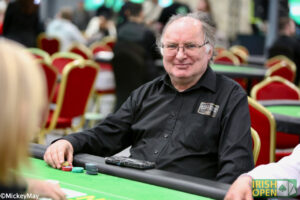
Peter remembers his mom telling him about “the big game” at O’Dea’s house. It was a very strict game; they would play once a week, start at 8 p.m., and play until one o’clock in the morning. It was the honour system; at the end of the night, you wrote a check to the other players if you lost. The one who had invited new players to the game was liable if they weren’t able to pay.
Colette, otherwise a very chatty character, stayed mostly quiet during the O’Dea games. The reason was that she eagerly listened to every analysis O’Dea shared from the previous hand when the deck was being shuffled. Keep in mind, this was the 1970s; there weren’t any books written on poker theory. If you wanted to learn, you had to learn from others, and/or figure stuff out for yourself.
Colette would have been 39 years old at this point, and she’d already started to be recognised as a good player, despite being fairly new to the game. The next year, 1980, the first-ever Irish Poker Open was held at the Eccentric Club. Padraig’s description of the venue sets the stage nicely:
“The club was very appropriately named; they had a secretary who couldn’t type, and the guy in charge of the money couldn’t look after his own. It was a little magical place on top of a shop on the North side of Dublin.”
According to Padraig, the first-ever European No Limit Hold ‘Em tournaments were held at the Eccentric Club. Terry Rogers was the mastermind behind all of this; he’d been to Las Vegas on business and dropped into Binion’s during the World Series of Poker (WSOP), and he brought the vision of Benny Binion back to Dublin and the Eccentric Club.
In terms of numbers, the 1980 Irish Poker Open may not have had 4,562 entries like this year’s edition; there were perhaps only three tables in play. Nevertheless, she won it, and a star was born.
Rogers was super thrilled about Colette’s win. Naturally, there weren’t any dedicated poker media channels during those days, but Rogers pulled some strings and got Colette’s triumph in the Irish mainstream press. A few days later, people could read a big article about a woman winning the first-ever Irish Poker Open, featuring what has become an absolute iconic picture of Colette.
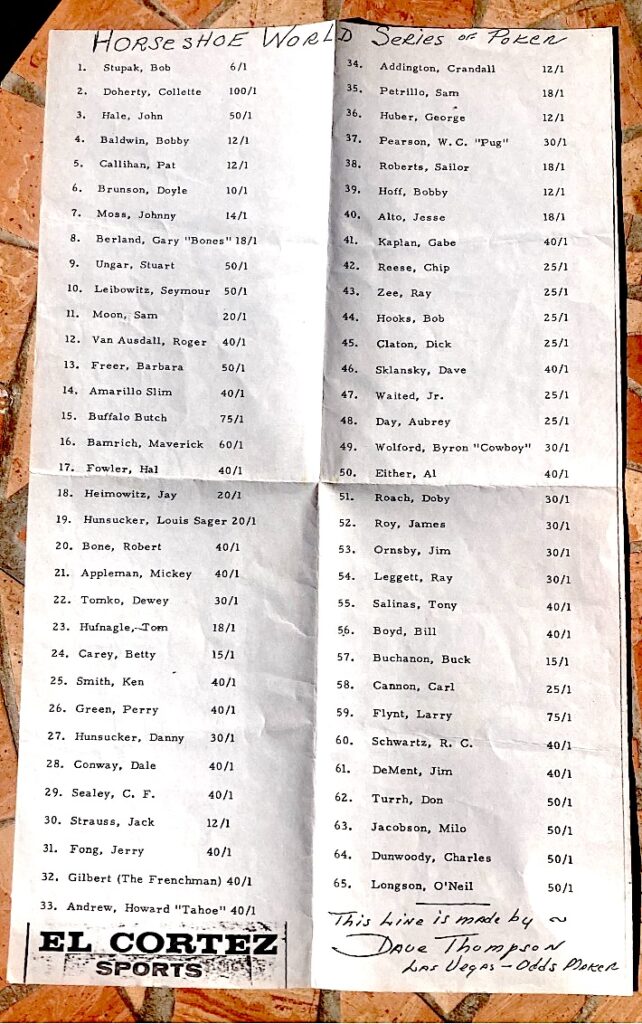
Within days, Rogers jumped on the phone and made a long-distance phone call to the States and Benny Binion. “Reserve a seat for Colette in the WSOP,” he allegedly screamed into the phone. Said and done, Colette took $10,000 out of her 1980 Irish Poker Open winnings (which basically was all of it), booked a flight to Las Vegas, and became the first ever Irish player to participate in the prestigious WSOP. Although she didn’t cash in the event, she paved a new path for many Irish successes on American soil.
The Second Win
At the time of her first Irish Poker Open victory, Padraig had yet to make Colette’s acquaintance. So far, he’d only been reading in the newspapers about the successes of Colette and O’Dea. Eventually, he befriended her at the Eccentric Club in 1985, and it would prove to be the start of a lifelong friendship.
By then, Colette was a big-time player, and she’d been a rapid adapter to Omaha, which had grown to become popular in Ireland. Being fans of gambling, the Irishmen seemed to take a liking to Omaha and all the action that it brought to the table. According to Padraig, Colette got the hang of it faster than 95% of the other players. She frequently played in the big Omaha game at the Fitzwilliam Club and stood the test of time for many years. One of Colette’s biggest strengths at the poker tables would be very evident during the Omaha games. Padraig reminisces:
Someone would be betting the river and representing a certain hand. Colette analysed all the previous streets, thinking, “Does the story make sense?” That was her biggest strength; she was a very good judge of when it didn’t, when everyone else would just “flip a coin” to decide if it did or didn’t. She was a master of reading the opponent.
Colette became known in the Irish poker circles for playing the game for days straight. At the Griffith Club, it was more or less considered a “Hit N’ Run” if you left the game within the first 24 hours. She passed the bar by some margin; Peter recalls his mother once playing a game at the Merrion for 91 hours straight.
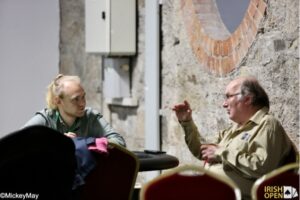
Fast forward to 1991, and the Irish Poker Open had started to grow. The field was perhaps twice as large as in 1980, and it was now played at the Green Isle Hotel. Padraig may not have been there for Colette’s first win, but from 1991, he even remembers that she beat “Metal Mickey” with ace-queen against ace-nine during the final hand of the heads-up. As Padraig wrote in an article from 2018, he can “still remember the hangover from the celebration”.
Showing the Way
Time went on, and Colette kept on winning in the biggest games in Dublin. Her record and her achievements have stood the test of time, and her son Peter has a theory about why players such as Colette, Padraig, and Donnacha all managed to stay successful and relevant over the years.
She learned how to lose, which is the downfall of most poker players. You’ve got to always believe in yourself. Most of the players are “crash and burn” cases; they can’t take the swings. She could take it because she learned how to lose. Padraig, Donnacha…all of them would sometimes lose big, but they always had a route back.
From what I’ve learned about Colette after my talks with Padraig and Peter, one quote from Peter really sticks with me, and appears to do her justice. He said: “She wasn’t trying to change anything; she just wanted to do her thing.” Colette didn’t care about what people thought about her.
Padraig also shares a somewhat emotional story about when Colette got him on the right track, and that story is another great example of her unselfish personality:
“Colette and I went to London once in 1994. I had too much fun at the bar when I should have been playing poker. When we got home, Colette had her car at the airport, and she drove me home. When she dropped me off, she told me, ‘I’m going to tell you this, and I’m going to tell you this only once. This can go two ways: if you get your act together, the sky’s the limit. If you don’t, there’s only pain ahead. It’s up to you, you decide’.
“Because Colette told me, I took it seriously. Six months later, I went to Vegas, and I didn’t miss a day of it for the next 20 years. This was all thanks to a 10-minute pep talk from Colette. It changed my life. Five years later, I was on the final table of the Main Event. Colette would’ve been thinking, ‘I told him’. But she didn’t tell anyone else. That was part of the way she was; she never took any credit or said ‘by the way, it was me who told him to get his act together.’ She was that of a good friend, and she never wanted the credit, but she just loved that it worked out for me.”
Not only was she a very genuine person who wanted the best for her friends, but Colette also had a knack for making other players enjoy poker. Back in the 1980s, poker wasn’t the most popular pursuit in Dublin, so in order for players to keep wanting to spend their disposable income playing poker, they had to enjoy it. As Padraig describes what made her so fun to have at the table:
One of her great strengths as a professional player was to entertain without looking like she was trying to entertain, because she, in fact, wasn’t trying to entertain. She was just funny and enthusiastic. And she could be sarcastic without being offensive. She had all the attributes you need. Colette was very good at making people be entertained; she was funny without trying to be, and she could curse like a hound.
The Later Years
During the 2000s, Colette’s preferred place to play was the Fitzwilliam Club in Dublin. During the games there, she repeatedly proved that she was still a force to be reckoned with.
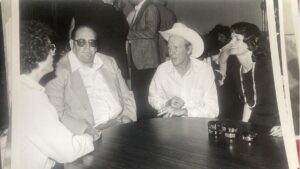
At this point, Padraig lived in Paris. Of course, he’d visit Dublin now and then, and pay the occasional visit to the Fitzwilliam Club. He’s very glad that he smoked back then; he and Colette would go out and share a smoke three or four times a night during the games, and she’d share with him her latest experiences and thoughts about the Irish poker scene.
When Colette turned 80, she found it more challenging to keep up with the younger players in the big game. Padraig reveals that Colette had no intention of giving any money back:
She was smart. When she turned 80, she figured she was losing a little bit of her sharpness. She had won a lot of money playing in the big game, and she didn’t want to give anything back. She left the bigger game before the bigger game left her, and moved down to somewhat smaller stakes where she still played very well. That was smart. Her smartness overruled her ego. The smaller game wasn’t a baby’s game; it was quite competitive.
There are many, many entertaining stories about Colette at the Fitzwilliam Club. Padraig can’t help but laugh when he tells the story about how she taught some Scandinavian fellas a lesson:
Colette told me she’d been in there one night playing the Omaha game. She was sitting there with a bunch of chips, and five Scandinavian gentlemen (read: kids) came in. They were looking at the game and at the “old lady”. Colette loved that, and boy, could she play the role of the old lady. It was like trying to pet an alligator. There was only one seat in the game; all five guys put their money together, and one of them played.
Colette played the part, and about 40 minutes later, the guy had lost all his money. “What the feck is going on, she’s not an old lady,” they must’ve thought. Colette said, “You want to get some more money and see if someone else of you would like to play with the old lady?” The guys said, “No, thank you,” and left.
Colette also returned to the Irish Poker Open a few more times. In 2018, Padraig convinced her to play in the Ladies’ Event. Overall, she wasn’t too interested in playing women-exclusive tournaments; she considered herself a poker player, not a female poker player. Perhaps her scepticism came from that one time she participated in the Ladies’ during the WSOP, again upon Padraig’s request. This was before names like Jennifer Tilly made the event be taken more seriously. When Colette played it, it was more of a fashion show than a tournament, and Padraig recalls Colette not feeling like she belonged among the other players:
The field consisted mostly of loaded housewives from Texas who were there killing time while their husbands played the WSOP. The women would be showing pictures of their grandchildren to each other. Colette’s language was priceless: “I don’t care about their fecking grand kids, why do they think I do?”
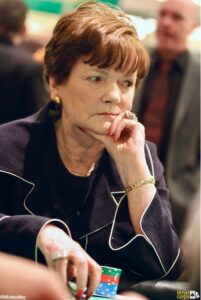
One Last Ride
The Fitzwilliam Club shut down in October 2019, one month before COVID-19. By now, Colette’s hearing and eyesight had taken a toll, and she didn’t put in as much volume at the poker tables anymore. She lived in a house very close to Peter, who looked after his mother wholeheartedly, just like he had been doing throughout the years.
Padraig hadn’t seen Colette since the pandemic started but in 2024, he and his friend Namir treated Colette, Peter, and Peter’s wife Mado to a Christmas lunch. The atmosphere was buzzing; Colette was, as Padraig describes it, “bright as a button and full of stories.” After lunch, Padraig managed to convince Colette that she should play a PLO game again at the Sporting Emporium.
A few months later, an Omaha game was organized and players made their way to the Sporting Emporium to partake in some four-card shenanigans together with a proper poker legend. Padraig means that what Colette did when she was just about to enter the cardroom describes her fighting spirit perfectly:
Colette was getting fairly fragile at this stage, but she came in, got to the door of the casino floor, got out of her wheelchair, and walked from the door to the poker table with her head held high. I was thinking, “God, please don’t fall.” She wasn’t going to let the other players see her in a wheelchair; she didn’t want sympathy; she wanted to show strength.
It was great; the last time she came in, she went out like a champion. It doesn’t sound like much until you realize what she put into those steps. That was all the pride, the competitive spirit, the love of the game, the refusal to bend.
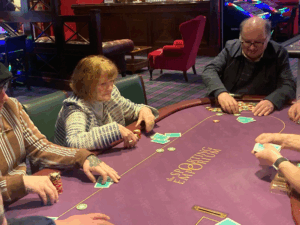
The game was fun, and when the two comrades parted ways after the last hand, Padraig was hopeful they’d be able to do it again on a semi-regular basis. Sadly, the prophecy never came true. This was the last time Colette played poker in an organized form. It’s worth mentioning, however, that Padraig, Colette, and Donnacha went out for lunch the next Christmas as well, and even though they never got around to playing cards, it was for sure a poker royalty session.
A couple of months ago, Padraig got the call from Peter. Colette had passed away at home on February 22, 2025. Even though saddened by the news, Padraig was pleased she had gone just the way she wanted to. No doctors, no hospitals, just sleeping peacefully.
The Legacy
Colette was a trailblazer for women in poker, but she never intended to be one, nor was she aware of the path she carved out for those who followed. She left behind an incredible legacy as Padraig describes:
What Colette did in 1979… she broke all the rules about what a woman, a girl, a lady, was supposed to do. She was marching to her own drum. She didn’t knock on doors, she fecking kicked them down. She brought things forward 10-15 years and made women comfortable competing on the Irish poker scene. She spoke to a male-dominated world and said “This is for everybody. If anyone has a problem with it, speak up now.”
Padraig recalls Kara Scott finishing second in the Irish Poker Open in 2009 and told Colette he believed she was the one who had made it possible for a woman to thrive at the event.
Peter agrees that his mother’s impact was never her intention, nor was it something she took credit for:
“She accidentally found herself in a world that you couldn’t plan for back then; there was no one else doing it. She was like a maverick. She was never aware of the path that she was digging. She wasn’t trying to change anything, she just wanted to do her thing. She didn’t know she was planting seeds for everyone else. Regarding her personality: if she liked you, you’d know. If she didn’t like you, you wouldn’t know.”
Of course, the Irish Poker Open, with JP McCann and Paul O’Reilly at the helm, has also paid its respects to the two-time champion. During the 2025 Irish Poker Open, Peter was invited to deliver the legendary words “Shuffle up and deal” in his mother’s honour, as the iconic picture of Colette smoking in a cowboy hat was displayed on all TV screens at the Royal Dublin Society.
At his mother’s funeral, Peter quoted Padraig’s fitting phrase to describe the Irish poker legend that was Colette Doherty. When Padraig heard the words, he thought to himself, “I don’t recall saying that, but I hope I did, because it’s brilliant”. He went home, browsed the archives, and sure enough, they were his words. It should be a fitting way to end this homage too:
Beneath the classy, feminine exterior beat the heart of a gladiator with the compassion of a contract killer.
